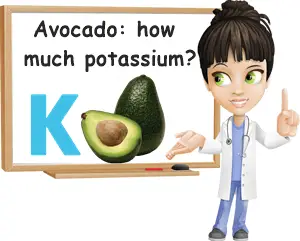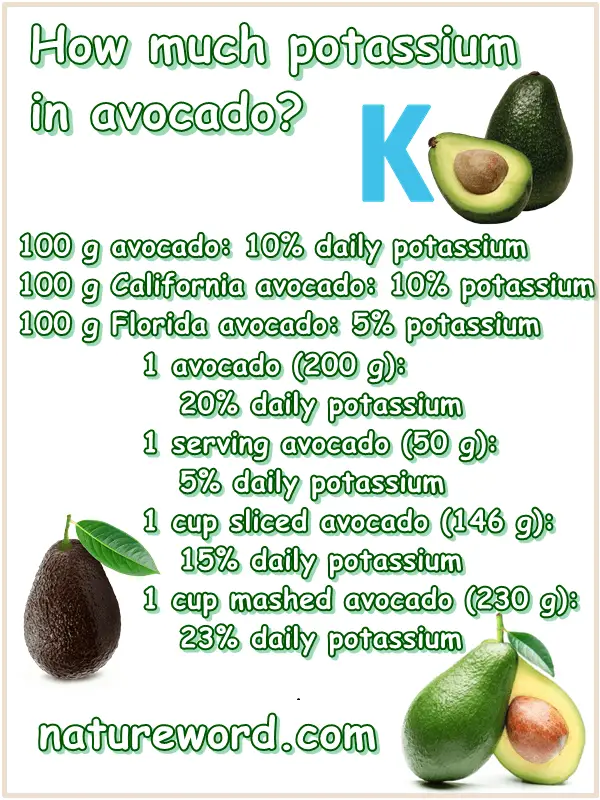Avocado is the epitome of clean eating and a healthy fruit, rich in potassium and other essential nutrients. But just how high in potassium is avocado? Do avocados have more potassium than bananas? Are avocados one of the foods highest in potassium? How many avocados do you have to eat to get your daily potassium? Can you even eat avocado every day? And how much avocado can you eat a day?

How much potassium in avocado?
- There are 485 mg (milligrams) of potassium per 100 g (grams) of avocado, or 3.5 oz (potassium content estimated for all avocado varieties).
- There are 507 mg of potassium in 100 g of California avocado.
- There are 251 mg of potassium in 100 g of Florida avocado.
- There are 975 mg of potassium per one avocado fruit at an estimated weight of 200 grams.
- There are 242 mg of potassium per one serving of avocado at an estimated weight of 50 grams.
- There are about 708 mg of potassium per one cup of sliced avocado at an estimated weight of 146 g a cup.
- There are 1120 mg of potassium per one cup of mashed avocado at an estimated weight of 230 g a cup.
Is avocado high in potassium?
On the potassium rich foods chart, avocado ranks high, however, it’s not the absolute best source of potassium. But just how high in potassium is avocado? A serving of 100 grams of raw avocado provides a little over 10% of the daily potassium requirements of the average adult, more exactly, 10.3% potassium (average value for all commercial varieties of avocado).
- 100 grams of raw California avocado provides 10.7% of daily potassium values.
- 100 grams of raw Florida avocado provides a little over 5% of daily potassium values (5.3%, to be more exact).
- 1 avocado fruit at an estimated weight of 200 grams provides over 20% of daily potassium values (20.7% to be more exact).
- One serving of raw avocado at an estimated weight of 50 grams provides 5% of daily potassium values.
- 1 cup of sliced avocado (146 g a cup) provides 15% of daily potassium.
- 1 cup of mashed avocado (230 g a cup) provides over 23% of daily potassium values (23.8% to be more exact).

Avocado potassium content vs banana
Do avocados have more potassium than bananas? If we were to compare avocado potassium content vs banana potassium content, we’d come to an interesting conclusion: while avocados have more potassium than bananas for the same amount of fruit (485 mg potassium in avocado vs 358 mg potassium in bananas), the serving size for avocado is smaller than the serving size for bananas which means you actually get less potassium from eating avocado and more from eating bananas.
According to recent nutritional guidelines, you can eat 50 grams of avocado per day which is one serving of the fruit. By comparison, you can eat 126 grams of banana per day which also constitutes one serving. So because banana serving size is more than double than avocado serving size, you actually get more potassium from eating bananas rather than avocado. That’s bananas, right?
One serving of avocado at 50 grams gets you 242.5 mg of potassium which accounts for only about 5% of your daily potassium requirements. One serving of bananas at 126 grams gets you 451 mg of potassium, almost as much as 100 grams of avocado, and accounts for almost 9.6% of your daily potassium requirements.
Of course, individual food preferences have to be taken into account. For example, if you don’t like to eat bananas at all, then, between the two, avocado is definitely the best option for you to get your daily potassium from. Other potassium rich foods, with a higher potassium content than avocado, include: chestnuts, cashews, Brazil nuts, dried apricots, fava beans and orange juice.
See also: Is Garlic High In Potassium?
Is it ok to eat an avocado a day?
How much avocado can you eat every day without side effects? Can you eat an avocado a day? Can you even eat avocado every day? Like with all foods, there are benefits and side effects to eating avocado. While reasonable intakes are almost exclusively a source of benefits for health, unless a person is allergic to the fruit in which case consumption must be avoided, excessive intakes are a source of side effects.
While you can definitely eat avocado every day, and it’s both safe to do so and good for you, it’s important to keep to dietary guidelines and only eat the recommended serving size which is 50 grams of avocado per day. That is, if you eat it every day. If you don’t eat avocado every day, then you can definitely have more than the recommended serving size because the higher one-time intake is balanced by the fact that consumption is infrequent.
How many avocados do you have to eat to get your daily potassium?
The average adult needs an estimated 4700 milligrams of potassium per day, or 4.7 grams. This would mean that you would have to eat approximately 4.8 avocados at 200 grams each to get your daily potassium. That is, over 900 grams of avocado per day. Of course, this is too much and a sure way to experience side effects and adverse reactions.
Instead of getting all of your daily potassium from just one food, it’s best to get it from different foods. Foods with a good to high content of potassium include: avocado, bananas, dried apricots, kiwifruit, orange juice, broad beans, broccoli, Brussels sprouts, butternut squash, chard, carrots, and especially Brazil nuts, cashews, chestnuts, acorns and other nuts and seeds.
